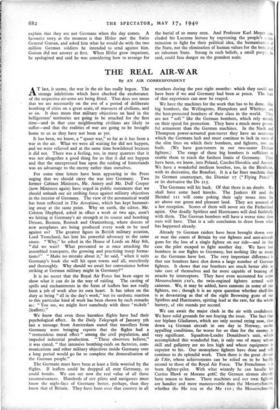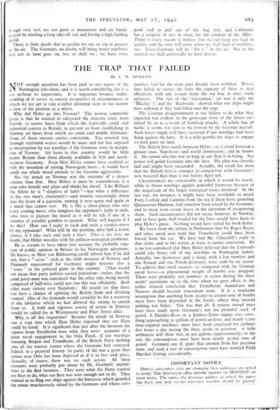THE REAL AIR-WAR
By AN AIR CORRESPONDENT
AT last, it seems, the war in the air has really begun. The strange inhibitions which have checked the exuberance of the respective air-arms are being fitted. That does not mean that we are necessarily on the eve of a period of deliberate bombing of cities on a great scale, of massacre of civilians, and so on. It does mean that military objectives on land in the belligerents' territories are going to be attacked for the first time—and in that case neighbouring civilians are likely to suffer—and that the realities of war are going to be brought home to us as they have not been as yet.
It has been, we know, a "queer war," so far as it has been a war in the air. What we were all waiting for did not happen, and we were relieved and at the same time bewildered because it did not. There was a feeling, too, in many quarters that it was not altogether a good thing for us that it did not happen and that the unexpressed ban upon the raiding of hinterlands was an advantage to the enemy rather than ourselves.
For some time letters have been appearing in the Press urging that we should carry the war into Germany. Two former Cabinet Ministers, Mr. Amery and Mr. Duff Cooper (now Ministers again) have urged in public statements that we should unleash our air striking force against military objectives in the interior of Germany. The view of the aeronautical world has been reflected in The Aeroplane, which has kept hammer- ing away at the same point. Why on earth, the editor, Mr. Colston Shepherd, asked in effect a week or two ago, aren't we hitting at Germany's air strength at its source and bombing Dessau, Bremen, Rostock and Oranienburg, where dozens of new aeroplanes are being produced every week to be used against us? The greatest figure in British military aviation, Lord Trenchard, has lent his powerful advocacy to the same cause. "Why," he asked in the House of Lords on May 8th, "did we wait? What prevented us at once attacking the assembled transports, the growing and practising troop forma- tions?" "Make no mistake about it," he said, "when it suits Germany's book she will hit open towns and all, mercilessly and thoroughly. Why should we await her convenience before striking at German military might in Germany?"
It is no secret that the Royal Air Force has been eager to show what it can do in the way of raiding. The casting of spells and enchantments in the form of leaflets has not really been a job of work after its own heart. It has taken on the duty as being "all in the day's work," but its sardonic reaction to this particular kind of work has been shown by such remarks as: "You see, we might hurt somebody with these ' nickels ' (leaflets)."
We know that even these harmless flights have had their psychological effect. In the Daily Telegraph of January 5th last a message from Amsterdam stated that travellers from Germany were bringing reports that the flights had a "tremendous moral effect" among the civil population, and impeded industrial production. "These observers believe," it was stated, "that intensive bombing-raids on factories, com- munications and other military objectives inside Germany over a long period would go far to complete the demoralisation of the German people."
The Germans must have been at least a little worried by the flights. If leaflets could be dropped all over Germany, so could bombs. We can see now the real value of all those reconnaissances. Hundreds of our pilots and navigators must know the night-face of Germany better, perhaps, than they know that of Britain. They have been over that country in all weathers during the past eight months: which they could not have been if we and Germany had been at peace. The fruit of that experience can now be reaped.
We have the machines for the work that has to be done. Our big bombers, the Wellingtons, Hampdens and Whitleys. are the best-protected bombers of their class in the world. They are not " soft " like the German bombers, which rely mainly on their speed for protection. They have a much more pe,ver- ful armament than the German machines. In the Nash and Thompson power-actuated gun-turret they have an acces,niT which the Germans lack and must continue to lack in view of the slim lines on which their bombers, and fighters, too. re built. (We have gun-turrets in our two-seater Defiant fighters.) The range of these big bombers is sufficient to enable them to reach the farthest limits of Germany. They have been, we know, into Poland, Czecho-Slovakia and Austria. We have a wonderful medium bomber, too, in the Blenheim, with its derivative, the Beaufort. It is a far finer machine than its German counterpart, the Dormer 17 (" Flying Pencil ", or its derivative the Do 215.
The Germans will hit back. Of that there is no doubt. We shall have some hard knocks. The Junkers 88 and the Heinkel xii will come poking their ugly noses into the air above our green and pleasant land. They are assured of a hot reception. Scores of them will never see the Fatherland again. Our deadly Spitfires and Hurricanes will deal faithfully with them. The German bombers will have a worse time than ours will have. That is a safe conclusion to draw from what has happened already.
Already 70 German raiders have been brought down over or near the coasts of Britain by our fighters and anti-aircraft guns for the loss of a single fighter on our side—and in that case the pilot escaped to fight another day. We have lost bombers in our flights to Germany, but nothing like as many as the Germans have lost. The very important difference is that our bombers have shot down a large number of German fighters. It shows that our bombers are much better able to take care of themselves and far more capable of beating off attacks by interceptors. They have even accounted for some Messerschmitt Ho's, the twin-engined fighters armed with cannons. We, it may be added, have cannons in some of our fighters, too ; though it is an open question whether shell-fire is as devastating as that of the eight Browning guns of our Spitfires and Hurricanes, spitting lead at the rate, for the whole battery, of 160 rounds per second.
We can await the major clash in the air with confidence. We have solid grounds for not fearing the issue. The fact that our biplane Gladiators, which are only second string now, shot down 14 German aircraft in one day in Norway, under appalling conditions, far worse for us than for the enemy is very significant. Squadron-Leader Donaldson's unit, which accomplished this wonderful feat, is only one of many whose skill and gallantry are no less high and whose equipment is superior to his. Our monoplane fighters have done and will continue to do splendid work. Then there is the great Angie de l'Air, whose achievements can be relied on to be hardly second to those of the Royal Air Force. The Frenchman is a born fighter-pilot. With what wizardy he can handle his Curtiss Hawk or Morane 4o6C the German airmen alrody have reason to know. These machines and our own fighters are handier and more manoeuvrable than the Messerschnntts. whether the Me 109 or the Me to ; the Messerschm: thaugh very fast, are not good at manoeuvre and are handi- capped by needing a long take-off run and having a high landing speed.
There is little doubt that in quality we are on top at present in the air. The Germans, no doubt, will bring better machines into use as time goes on, but so shall we ; we have some good stuff to pull out of the bag still, and California has a surprise or two in store, for the comfort of the Allies. There is every reason to believe that we can keep our lead in quality, and the time will come when we shall lead in numbers, too. Then Germany will be "for it" in the air. But in the interval we shall admittedly be hard driven.



































 Previous page
Previous page